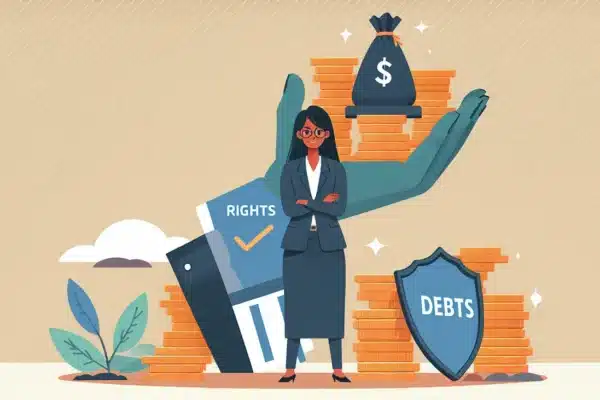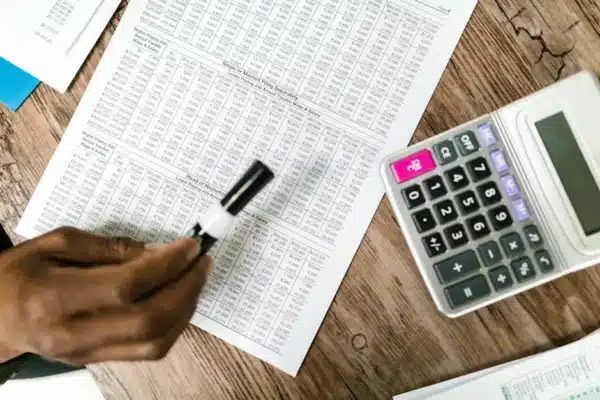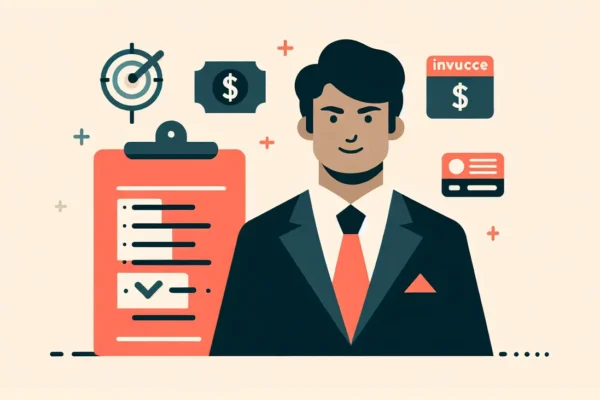Understanding Commercial Debt Collection: A Primer
Commercial debt collection is a process businesses use to get money that’s owed to them by other businesses. It’s not like asking a friend to pay back a loan. It’s more formal and there are rules to follow. Think of it as a necessary step for a business to keep its cash flowing and to make sure everyone plays fair.
Firstly, the process kicks off when a business, let’s call them the creditor, realises that another business, the debtor, hasn’t paid up for goods or services provided. It’s not just about making a phone call; there can be letters, SMSs, emails, and sometimes even meetings to try to sort things out.
Secondly, if those friendly reminders don’t work, the creditor might need to get a bit more serious. This can involve instructing a debt recovery specialist or going to Court. Yes, it sounds intense, but it’s about ensuring that businesses honour their commitments and protecting your business.
It’s crucial to know that there are laws that protect both sides. The creditor can’t harass the debtor, and there are limits to what can be done to collect the debt. This isn’t the wild west; it’s a critical process to ensure fairness and good outcomes.
In summary, commercial debt collection is about maintaining a healthy flow of cash for businesses by legally pursuing unpaid debts. Understanding this process helps businesses manage their finances better and fosters a culture of responsibility and fairness in the commercial world.
Identifying Challenges in Commercial Debt Collection
In the world of business, collecting debt is a tough job. It’s full of challenges that can make even the most seasoned professional pause. Let’s break down what you’re up against.
First, there’s the issue of avoiding legal pitfalls. Laws surrounding debt collection are tight and always changing. You need to be on your toes to make sure you don’t step on any legal landmines.
Then, there’s the matter of maintaining a good relationship with your client. You want your money, sure. But burning bridges? Not always a great plan for future business.
Also, consider the reliability of the information you have about the debtor. Outdated or incorrect info can send you on a wild goose chase, wasting time and energy.
Lastly, dealing with disputes over the debt itself can be tricky. It often turns into a she-said-he-said scenario, making it hard to know the best way forward. These challenges can be daunting, but knowing is the first step to overcoming them.
The Importance of Documentation in Debt Recovery
Every expert will tell you, documentation is your best friend in debt recovery. Without it, it’s your word against theirs, and that rarely goes well. You see, having a solid trail of documentation means you’re not just relying on memory or verbal agreements, which can easily be disputed or forgotten. It’s about having every piece of evidence from invoices, agreements, payment reminders, to communication records.
This isn’t just busy work. This documentation is powerful. It shows you’ve been professional, consistent, and clear in your attempts to recover the debt. It proves your case not only to the debtor but possibly in a legal scenario if it comes to that. It can turn the tables in your favour. Simply put, never underestimate the power of having your paperwork in order. It can be the difference between successful debt recovery and a frustrating standoff.
Effective Communication Strategies with Debtors
Talking to debtors is key. Think of it as a chat, not a chase. Keeping it cool, clear, and direct does wonders. First off, always know who you’re talking to. Verify the debtor’s identity to avoid mix-ups. Next step, clarity. Be crystal clear about the debt details—how much, since when, and due by when. Misunderstandings can make things messy. Now, listen. Yes, really listen. Debtors might share why they’re behind. Understanding their situation can help find mutual ground. Keep the tone respectful and professional. Anger leads nowhere. Lastly, follow up but don’t badger. Remind them gently but firmly about the debt. Remember, it’s a conversation, aiming for resolution, not confrontation.
Legal Framework: Knowing Your Rights and Boundaries
When you’re diving into the world of commercial debt collection, it’s crucial to start with a solid understanding of the legal framework and options available. This isn’t just about knowing the rules; it’s about ensuring you’re playing fair and keeping your reputation intact. Know your rights, but respect the boundaries. Every country, and often each state within a country, has its own set of laws and regulations governing debt collection. For instance, in the UK, the Financial Conduct Authority (FCA) sets the do’s and don’ts for collectors, but remember, it primarily applies to consumer rather than commercial debt collection. However, there’s bodies and organisations that support businesses and conduct, so best practices should extend similar protections to businesses.
What does this mean for you? First, you’re not allowed to harass or threaten the debtor. No calling them at odd hours or using intimidating language. Second, be transparent. You can’t pretend to be someone you’re not, like a government official, to scare them into paying. And finally, know the limitations. There’s a statute of limitations on debt, and if it’s expired, you can’t legally enforce payment.
Being aware of these basic legal boundaries not only keeps you out of trouble but can also help maintain a positive relationship with your debtor. Remember, the goal is to get paid, not always to burn bridges. So before you make that next call or send out a demand letter, make sure you’re fully clued up on the legal landscape. It could save you more than just a headache down the line.
Utilising Technology for Efficient Debt Collection
In the world of commercial debt collection, technology has become a game-changer, making processes faster and more efficient. Experts suggest using software that automates sending out reminders and notices to debtors. This not only saves time but reduces the chance of errors too. Moreover, embracing digital platforms allows for tracking communications and payment plans easily. It’s critical to have systems that can analyse data to identify patterns or behaviours in payment defaults. This insight helps in customising approach methods for different types of debtors.
Additionally, online payment solutions make it convenient for debtors to clear their dues, increasing the likelihood of collection. In essence, leveraging technology in the debt collection process is a smart move that can significantly improve success rates.
When to Hire a Professional Debt Recovery Agency
Deciding when to hire a professional debt recovery agency can make or break the recovery of your outstanding funds. The moment you notice a pattern of late payments or consistent non-payment is your cue. There’s a window of time, typically between 30 to 60 days of delinquency, when involving a recovery agency becomes most effective. Waiting too long can decrease the chances of recovering your money.
This doesn’t mean you should necessarily rush to a recovery agency as soon as a payment misses its due date. Initially, try reaching out to your debtor directly. Often, a simple reminder or a personal discussion can solve the issue. If these attempts don’t yield results, and the outstanding debt starts affecting your cash flow, it’s time to call in the experts.
Remember, the reputation of your business is crucial. Opt for a recovery agency known for handling debts professionally and ethically. This way, you safeguard your business relationships and improve the likelihood of debt recovery.
Negotiation Techniques for Successful Debt Recovery
Negotiation is key in commercial debt recovery. Remember, the goal is to get paid, not make enemies. Start by understanding the debtor’s situation. Are they facing a temporary setback or a larger financial crisis? This knowledge lets you tailor your approach.
Offer solutions like extended payment plans or reduced settlement amounts. It’s a give and take. Always communicate clearly and without jargon. This makes your intentions plain and the debtor more likely to cooperate. Stay professional but assertive. You’re not here to bully, but you mean business. Documentation is your friend. Every agreement, every promise, record it. This isn’t just for legal reasons; it shows you’re serious and structured.
Finally, be ready to compromise. Getting 100% of what’s owed often isn’t realistic. Decide what’s acceptable and work towards that. It’s about finding a middle ground where both parties can walk away satisfied, if not happy.
Handling Disputes and Resolving Conflicts Amicably
When it comes to collecting debts, disputes and conflicts are almost a given. But here’s the thing, resolving them amicably is your best bet. It preserves business relationships and keeps your reputation in check. First off, listen. Really listen to what the debtor says. This isn’t just about hearing them out; it’s about understanding their side of the story. Misunderstandings can often lead to disputes, and you might find that the issue is simpler to resolve than you thought.
Next up, keep your cool. Getting heated won’t solve anything. Stay professional and aim for a solution that works for both parties. If you’re hitting a wall, consider mediation. It’s a way to bring in a neutral third party to help work out a resolution. This step can save you time, money, and stress compared to taking legal action.
Remember, the goal isn’t just to get your money; it’s to maintain a professional relationship that can continue to be beneficial down the line. So, approach disputes and conflicts with a level head and a focus on resolution.
Key Takeaways and Best Practices in Commercial Debt Recovery
When it comes to commercial debt collection, there are no shortcuts, but understanding the best practices can turn a challenging process into a more successful endeavour. To start, always prioritise clear communication. Reach out to debtors in a professional yet firm manner. It’s essential to establish an open line where both parties feel heard. Secondly, knowledge is power. Familiarise yourself with the debtor’s situation. Sometimes, a flexible payment plan is more effective than demanding the total amount upfront.
Documentation is next on the list. Keep meticulous records of all communications and agreements. This not only helps in maintaining clarity but also serves as proof if the situation escalates to legal action. Another crucial practice is staying informed about local and international debt collection laws to ensure that your methods are always within legal boundaries.
Lastly, consider the timing. Acting swiftly can increase the chances of successful debt recovery. Delays can lead to complications. However, also know when to escalate matters to a professional debt recovery agency. They have the expertise and resources to handle stubborn cases, turning dead ends into recoverable assets.
Remember, the goal of commercial debt collection is not just recovery; it’s also preserving relationships where possible. Approach each case with a strategy that balances firmness with empathy, using these key takeaways as your guide.







